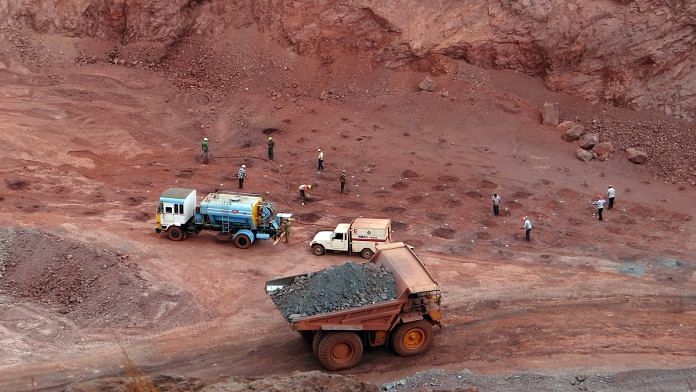New Delhi: The southern region of the Federation of Indian Mineral Industries (FIMI) has moved the Supreme Court with a plea to remove the maximum permissible annual production (MPAP) restriction imposed on iron-ore leases in the four districts of Karnataka — Bellary, Chitradurga, Tumkur, and Vijayanagara.
A representative body of various public sector undertakings, steel and other metal producers, mining companies and regional associations, FIMI has sought a review of more than a decade old restriction that was placed on iron-ore extraction in the four districts following reports of rampant illegal mining operations in these regions.
In two separate orders of July and August 2011, the top court had imposed a ban on iron ore mining in the four districts. Subsequent to reports from court-constituted body — Central Empowered Committee — as well as other organisations, SC in April 2012 resumed iron ore mining, subject to production caps, while directing cancellation of some lease holders.
The limit on production was over-and-above the restrictions already put in place by way of mining plan, and environmental clearances under the law. Additionally, it directed disposal of the accumulated iron ore through e-auction, which was to be conducted by the court-appointed monitoring committee. A special purpose vehicle (SPV) was constituted to take mitigating measures.
FIMI described the unauthorised mining operations prevalent in Karnataka a decade ago as an “extraordinary situation,” that became the basis for the court to first ban iron ore extraction and then limit it. This situation had arisen on account of large-scale illegalities, causing irreparable loss to the forest wealth of the country, besides colossal loss to the national exchequer.
A decade later, the application mentioned, the “extraordinary situation” no longer exists. It has undergone substantial modifications, with the introduction of a more robust legal and regulatory framework and an auction regime. Policing measures along with penal provisions for non-compliance of the legal regime eliminate any risk of illegal activity and ensure sustainable mining operations, in accordance with the law, said the application submitted, requesting the court to do away with the production cap.
According to FIMI, MPAP is leading to “disparities, unique legal challenges and unwanted litigation”.
During a hearing on 30 November, a special bench led by Justice Sanjiv Khanna heard FIMI on the application and asked for a response from Karnataka and the Centre. It will take up the application in February 2024.
Also read: India to conduct 1st-ever auction of critical, strategic minerals. 20 blocks up for sale Wednesday
What FIMI’s application said
Providing details of the new legal mechanism implemented following top court’s two orders of 2011 and 2012, the application said the Centre in 2015 brought in the auction regime for mining by amending the Mines and Minerals (Development and Regulation) Act, 1957, extensively.
The new monitoring mechanism, called the Mining Surveillance System (MSS), was also developed. Based on the satellite-monitoring system, MSS uses space technology to curb illegal mining activity in the country, as it checks a region of 500 metres around the mining lease boundary and flags the respective state government in case a discrepancy is found.
The application also referred to the August 2022 order of SC wherein the latter had increased the district-wise annual ceiling on iron ore production. For Bellary it was raised from 28 MMT to 35; for Chitradurga and Tumkur, it was doubled from 7 to 15 MMT.
In May this year, the court had also modified its 2012 order to dispose of extracted iron ore through e-auction, noting the procedure had received a poor response. It allowed the already excavated stock to be sold directly and also permitted their export. FIMI quoted the May order too in its application to lift the iron ore limit in the four Karnataka districts.
On account of these developments, FIMI said, the continuation of MPAP limitation is no longer necessary. Besides, FIMI added, MPAP is only existing in Karnataka, which is discriminatory.
Mining operations in other parts of the country are governed by ordinary law and other ancillary regulatory measures such as environmental clearance. However, since the reasons for imposing the restrictions are no longer prevalent, hence, the classification that was drawn to undo the environmental damage caused due to rampant illegal mining need not continue, the application has submitted.
FIMI supported its no cap plea with the contention that there is surplus iron ore available in India, which it said is established through data available with the Indian Bureau of Mines and the United States Geological Survey. Despite widespread production and excavation of iron ore, the resources have increased continuously over the years as well.
FIMI added that with improvements in technology and increased exploration during mining, more and more reserves are being discovered for use. It also mentioned Government of India’s policy to promote recycling of steel, one of the iron ore products, allaying concerns over exploitation of restricted sources available for iron ore.
(Edited by Zinnia Ray Chaudhuri)
Also read: Himachal to ‘consider controlled riverbed mining’ to curb floods but environmentalists sound caution



